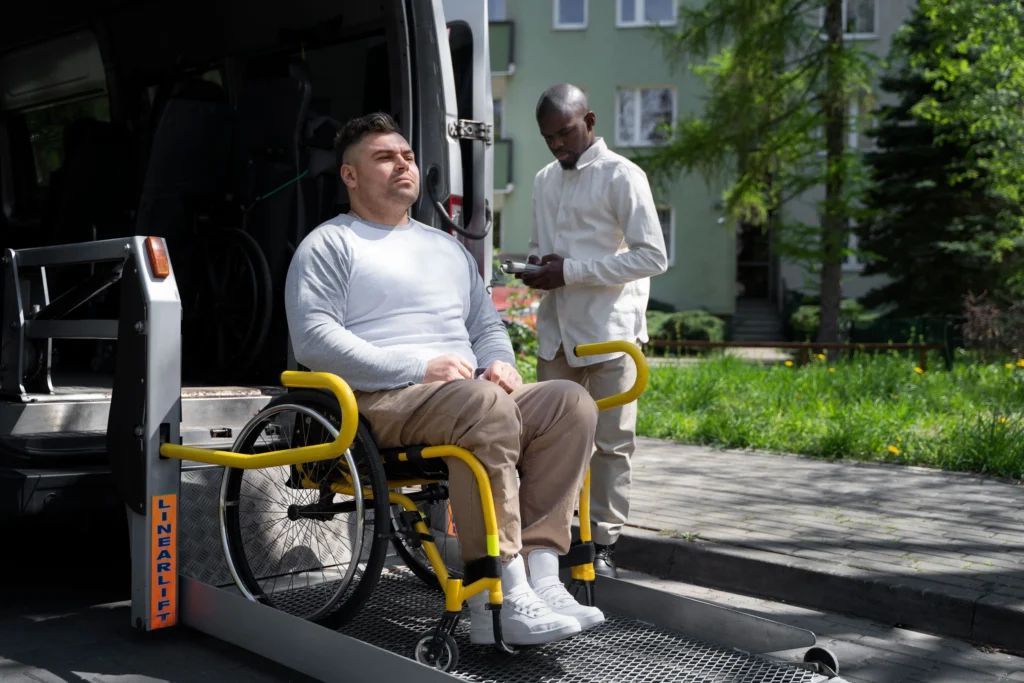
Are you ready to take your NDIS transport services to the next level? Securing funding is a crucial step in expanding and improving your services. In this comprehensive guide, we will break down everything you need to know about securing funding for NDIS transport services. From understanding the application process to tips on how to stand out from the competition, we’ve got you covered. Get ready to unlock new opportunities and make a lasting impact in the community with our expert advice. Let’s get started!
Introduction to NDIS Transport Services
The National Disability Insurance Scheme (NDIS) was established in 2013 with the aim of providing support and services to Australians living with a disability. It is a government-funded program that aims to improve the quality of life for individuals with disabilities by giving them access to necessary resources and supports.
One of the key areas covered under NDIS transport services, which are essential for people with disabilities to access education, employment, healthcare, social activities, and community participation. The NDIS recognises the importance of transportation as a means for individuals with disabilities to lead independent lives and offers funding for various transport options.
Transport services under NDIS can be categorised into two types: funded transport and non-funded transport. Funded transport includes supports that are directly related to an individual’s disability and are listed in their NDIS plan. Non-funded transport refers to any other form of transportation required by an individual that is not included in their plan.
Funding for Transport Services under NDIS
To secure funding for transport services under NDIS, individuals must first be eligible for the scheme. This includes being between 7 years old and retirement age, having a permanent disability or developmental delay that significantly impacts daily functioning, and being an Australian citizen or permanent resident.
Once deemed eligible, participants will work with a NDIA planner or Local Area Coordinator (LAC) to create a personalised plan based on their specific needs and goals. Transportation needs will be assessed during this planning process to determine what type of support is necessary.
Funded Transport Options
There are several funded transportation options available under NDIS depending on an individual’s situation:
- Accessible public transport – This option provides funds for assistive equipment such as ramps or wheelchair restraint systems on public buses or trains.
- Taxi fares – Participants may receive funding towards taxi fares if they have no other means of transportation.
- Community transport – This option provides door-to-door transport services for individuals with disabilities who are unable to use public transport.
- Vehicle modifications – NDIS can also provide funding for vehicle modifications or specialised vehicles to meet an individual’s specific transportation needs.
Non-Funded Transport Options
In addition to funded options, participants may also access non-funded transport services through the NDIS by using their plan’s core support budget. This includes hiring a support worker or personal carer to assist with transportation, purchasing a suitable vehicle, and covering fuel costs.
Conclusion
Securing funding for NDIS transport services is crucial in helping individuals with disabilities achieve greater independence and access essential resources and supports. Through the various funded and non-funded options available, the NDIS aims to improve the lives of people living with disabilities by providing them with safe and reliable transportation options.
Understanding the NDIS Funding Process

The NDIS is an Australian government program providing support for individuals with disabilities. Navigating NDIS transport services involves understanding eligibility, funding categories, and the application process.
Eligibility requires a permanent disability affecting daily activities. Funding includes core supports like transport assistance, determined using the Support Intensity Scale. Creating a detailed plan and managing funds efficiently is crucial.
Applying for NDIS transport services involves determining eligibility, understanding specific needs, gathering relevant documents, consulting with a Local Area Coordinator, completing an application form, and awaiting approval.
Eligibility criteria involve age (under 65), Australian residency, and a significant permanent disability affecting daily life. Meeting these criteria doesn’t guarantee automatic funding; the NDIA assesses the level of support needed.
Understanding eligibility criteria is essential for a successful NDIS funding application. It ensures support is provided to those genuinely in need. Seek assistance from a registered NDIS provider or the NDIA for guidance.
How to Register with the NDIS
The NDIS in Australia offers government-funded support, including transport services for individuals with disabilities. To register:
- Check Eligibility: Confirm you’re under 65 with a significant, permanent disability affecting daily activities. Use the NDIS Access Checklist on their website or contact NDIA.
- Gather Information: Collect necessary documents like age/residence proof, disability diagnosis, and support plans.
- Contact NDIA: Reach out to NDIA at 1800 800 110 or visit their website for an access request form.
- Complete Form: Fill in personal details and disability impact information either online or on a hard copy.
- Submit Application: Send the form and required documents online or by mail. NDIA will assess and request additional information if needed.
- Planning Meeting: If approved, attend a planning meeting to discuss your specific needs for NDIS transport services.
- Plan Approval: NDIA will develop a personalised plan for your approved support and funding. Review and provide feedback before final approval.
Follow these steps to successfully register with the NDIS transport services. Seek assistance from NDIA or community support services if needed.
Creating a NDIS Plan for Transport Services

Creating a NDIS Plan for Transport Services is crucial for obtaining funding through the National Disability Insurance Scheme (NDIS) to support transportation needs. The plan is a personalised roadmap outlining specific services and supports tailored to each individual’s unique requirements. Transport services encompass assistance for accessing community, social, economic, and daily life activities, including travel costs, vehicle modifications, and support during travel.
To initiate the process, assess eligibility and identify specific transport needs. Contact your Local Area Coordinator (LAC) or Support Coordinator (SC) for assistance in developing a plan based on your goals. Communication with the LAC/SC should be open and honest, discussing barriers, preferred transport modes, and other relevant details.
Prepare information, such as regular travel distance, frequency, special equipment needs, and support requirements, before meeting with the LAC/SC. This ensures a more accurate and comprehensive plan. Once finalised, regularly review the NDIS plan to make adjustments based on changing circumstances or goals. This approach ensures individuals with disabilities access necessary transportation supports, enhancing their quality of life and goal achievement.
Available Funding Options
Securing funding for NDIS transport services involves exploring various options provided by the National Disability Insurance Agency (NDIA). These options include:
- NDIS Participant Transport Budget – Participants can receive a budget for transport if assessed with mobility-related impairments, covering private or public transportation costs.
- Support Coordination – If support coordination is part of your NDIS plan, your Support Coordinator can assist in finding suitable transportation options and securing funding.
- Specialised Transport Services – Services like door-to-door transport or wheelchair accessible vehicles may be covered under your NDIS plan based on specific needs.
- Companion Card – Government-issued card providing free entry for carers and discounted public transport fares for individuals with disabilities.
- Carer Allowance – Primary carers of individuals receiving an Australian Government pension may be eligible for financial assistance.
- Taxi Subsidy Scheme (TSS) – State-based program offering subsidies for taxi fares, particularly for those unable to use public transport due to their condition.
Funding through Core Support involves Assistance with Daily Life, covering transportation costs related to daily tasks, and Social and Community Participation, which includes transport for community events. Specialised transport may be funded under Capital Supports, covering the purchase of assistive technology, equipment, and modifications. Capacity Building Supports focus on developing skills for independence, including navigating the NDIS system and accessing suitable transport options.
Documentation, clear plans, and collaboration with planners or Support Coordinators are essential to secure funding for NDIS transport services.
Tips for Maximising Your Funding Allocation
- Understand your NDIS transport services funding: Maximise your allocation by knowing what’s covered.
- Prioritise essential needs: List vital transport services like medical appointments and prioritise them to use funds wisely.
- Research providers: Compare services, ensuring they accept NDIS payments to avoid out-of-pocket expenses.
- Explore government subsidies: Utilise additional subsidies like the Companion Card or Taxi Subsidy Scheme to reduce costs.
- Optimise travel routes: Combine appointments to save time and money on transportation.
- Use community resources: Explore local organisations for free or low-cost transportation assistance.
- Track expenses: Keep accurate records for budget reviews and identify potential overspending areas.
- Plan for emergencies: Have a contingency plan to avoid using funds on non-essential services during unexpected events.
Effectively manage your NDIS transport services funding by following these tips, regularly reviewing your budget, and adapting to changing needs over time.
How TK Community Care Can Help
TK Community Care, a registered NDIS service provider, specialises in simplifying the overwhelming NDIS funding process for transport services. Our experienced team guides you through the application, ensuring all necessary documentation is gathered and providing additional information for approval.
We assist in selecting the right transportation options based on your needs and budget, offering wheelchair accessible vehicles, door-to-door services, and personalised travel assistance. Post-approval, we continue supporting you by managing funds effectively and providing regular updates on remaining transport service funding in your plan.
TK Community Care is committed to reliable and safe transportation, maximising NDIS funds for our clients. Our goal is to make the process stress-free, allowing clients to focus on their well-being. If you or someone you know is eligible for NDIS funding for transport services, contact TK Community Care for expert support in successfully navigating the funding process.



